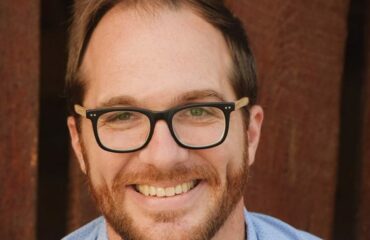LENT by Paul Lisicky
Father Jed’s head was stuck in Lent. He said these words to himself as a kind of talisman. Otherwise, his head would have split in two. He sat on the chancel with Father Benedict, the assistant pastor, up on the priest’s seat. Why was he so torn up on the night of the Easter Vigil? It was the most joyous mass of the year. The choir, the drummers, the brass ensemble, the woodwind players, the readers: everyone had been preparing for this night since the doldrums after Epiphany. The church was dark, completely dark. It gave Father Jed a thrill to think of one of those perpetual latecomers stalled at the vestibule. The dark made things scary. The dark made the first reading, the story of Abraham and Issac, scary. The dark made the second reading, the story of the Red Sea parting, even scarier. What kind of God would exact such a price on humans? Father Jed knew that doubt was acceptable. Doubt was of a piece with faith. You could not have faith without doubt. Faith was active, dynamic, but doubts on the night of the Easter Vigil? It was unseemly, as unseemly as the young men from Our Lady of the Martyrs, who hefted the cross of Good Friday on their shoulders across the Safeway parking lot, knowing full well they were in a Jewish neighborhood. Father Jed couldn’t see any of the faces of the people. Their candles were snuffed out. The Chilean wine palms shadowed the windows from outside, purpled, ghostly. Then the lights went on. Sister Ray was incensing the chancel and transepts, with the bowl she held high, her troop of six dancers behind her. They were leaping, reaching, turning, flashing through the smoke. Their gestures said, Our God is a good God. Our God is a friend to the stranger. The incense stung his eyes. It was so strong in the air that he tasted it on the back of his teeth. Someone coughed. The dance had seemed like a good idea back in February, long before the saguaro had bloomed by the front doors. Dance always had something of risk about it. Maybe this time someone would fuss to Bishop Ren, which was exactly what his parishioners wanted, something to get riled up about. And yet Father Jed wanted to slide down the priest’s seat, cringing in embarrassment for everyone assembled. Had the dancers listened to the readings? Had the people? Apparently not, as everyone facing the sanctuary looked hot with delight. They were so ready to sweep the rigors of deprivation aside. They were so ready to get out of that desert, though most of them had chosen to live in one, air conditioned. It took everything in Father Jed not to leap out of his seat, dash into the sacristy to turn off the lights. What would Sister Ray and her dancers do if they couldn’t see the seats? He imagined the startled gasp, the strangled cry. Now see who your God can be, Father Jed thought. He gripped the arms of the priest’s seat. Had he said those words aloud? He couldn’t tell outer from inner anymore. Oh God, dear God.
By the third reading, God said, “I am taking you back,” and Father Jed felt his eyebrows crisp as the responsorial psalm wended its way toward E minor. What had he been thinking? Had those ghastly thoughts sculpted his face? He looked out at the parishioners he was closest to—Juan Fernando in the second row, Daisy two rows behind Juan Fernando, Dean all the way in the back, face half-concealed behind a column—for reassurance, but none of them looked back. Surely his friends would let him know, these friends who had shared everything with him from their Xanax dependencies, to their breakups, to their bitter little affairs late into the evening as they walked along the arroyo. But none of them looked back at him. They were looking at the feet of Father Ben, which were just slightly off the floor. He was giving the sermon. He was doing his usual, linking Terminator 2 to Flannery O’Connor to one of the psalms, and managing to connect them with bleak, expert joy. Everyone was looking, as if by sheer looking they were keeping his feet in air. Father Benedict did not look down. He did not know what was happening any more than he knew what he was wearing on his feet, one shoe black, one shoe brown. The mismatched shoes didn’t appear to matter to anyone, which might have been why Father Jed got down on his hands and knees and crawled across the carpet toward Father Ben, with his own black shoe in hand.
Listen to Paul Lisicky’s reading of “Lent” below…
